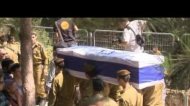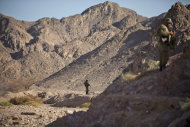JERUSALEM (AP) — Israeli airstrikes killed four Palestinian militants in Gaza while Palestinians fired rockets into southern Israel, hitting a synagogue and a school and wounding several Israelis in the aftermath of the deadliest attack against Israelis in three years.
Palestinian militants in Gaza launched more than two dozen rockets into Israel on Friday, the Israeli military said. One smashed through a roof of a Jewish seminary, damaging a synagogue in the port city of Ashdod and wounding six Israelis who were standing outside, Israeli emergency services said. One hit an empty school and another, aimed at the city of Ashkelon, was intercepted by the new Israeli anti-missile system known as Iron Dome.
Israeli aircraft struck several targets in Gaza on Friday in retaliation for the rocket attacks, the military said, killing four Palestinian militants. One strike hit a motorcycle carrying senior militants from the Palestinian group Israel says is behind Thursday's violence. Another five militants were killed Thursday night.
Gunmen who appear to have originated in Gaza and crossed into southern Israel through the Egyptian desert ambushed civilian vehicles traveling on a remote road, killing eight people. Six were civilians, and two were members of Israeli security forces responding to the incursion.
Thursday's attack signaled a new danger for Israel from its border with the Sinai Peninsula, which was always restive but had been kept under control by former Egyptian leader Hosni Mubarak. He was deposed in February, and the desert of the Sinai Peninsula — controlled largely by Bedouin tribes — has become increasingly lawless.
The sudden spike in violence threatened to upset the already frayed ties between Israel and Egypt and escalate the conflict between Israel and Hamas in Gaza.
Israel's south has been equipped with early warning systems and bomb shelters over years of rocket fire from Gaza, and those measures have helped keep casualties low.
Israeli Prime Minister Benjamin Netanyahu visited some of the wounded in hospital Friday afternoon. "We killed the head of the group that sent the terrorists but this is just an initial response."
The Israeli military's chief spokesman, Brig. Gen. Yoav Mordechai, said it was "too early" to say that a broad escalation in Gaza was imminent.
"If we see that Hamas is choosing to escalate, we will not hesitate to expand the scope of our actions, respond in strength and exact a price from Hamas," he told Israel Army Radio on Friday morning.
Israeli aircraft hit multiple targets in Gaza in response to the rocket attacks, the military said.
Egyptian officials said five Egyptian security personnel died as a result of Thursday's gunbattles. An Egyptian security official said three died Thursday and two others died of wounds on Friday. He said they were apparently caught in a crossfire as Israeli soldiers chased the attackers.
On Friday the Egyptian news agency said Egypt filed an official protest over the deaths and called on Israel to investigate.
An Israeli military officer gave a different version of the events. He said one of the attackers was a suicide bomber who fled back across the border into Egypt and detonated his explosives among the Egyptian security personnel. It was not possible to reconcile the two versions.
The military said Friday that Israeli forces killed seven militants during the clash. The officer, briefing reporters by phone on condition of anonymity according to military regulations, said there were at least 15 attackers — Palestinian militants from Gaza, members of an extremist group.
Israel responded hours after the border attack with an airstrike in Gaza that killed five members of the group, known as the Popular Resistance Committees. The dead included the group's leader.
A spokesman for the group, Abu Mujahid, would not confirm or deny responsibility for the attack inside Israel.
Also Friday, dozens of Palestinians trying to reach the Al-Aqsa Mosque in Jerusalem for Muslim prayers during the Muslim holy month of Ramadan scuffled with police at one of the gates to the Old City. The police were allowing access only to older Muslims in a measure police said is meant to prevent unrest.
The officers used a water cannon to disperse the crowd and made several arrests, police said. No injuries were reported.
The violence in the south focused Israel's attention on its border with Egypt — 125 miles (200 kilometers) of mountainous desert with no fence for most of its length. Bedouin smugglers ferrying drugs and thousands of African asylum-seekers into Israel have crossed the border almost unimpeded for years.
Thursday's attack — the deadliest for Israel since a Palestinian gunman killed eight people in a Jerusalem religious seminary in 2008 — took place near Israel's popular Red Sea resort city of Eilat, at the height of the tourist season.
Though the desert outside Eilat showed signs of an increased military presence on Friday morning, the city itself appeared unaffected. Joggers and cyclists were visible along the beach.
A new fence is currently under construction, and the military says it will be completed by the end of 2012.
The attack came after a prolonged period without negotiations between Israel and the Western-backed Palestinian leadership in the West Bank. That deadlock has led the Palestinians to unilaterally seek recognition of statehood at the United Nations next month, a largely symbolic move opposed by Israel and the U.S.


No comments:
Post a Comment